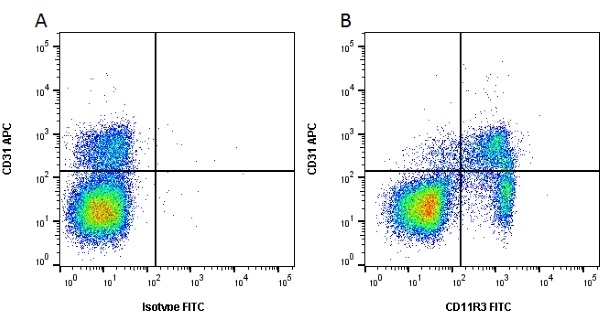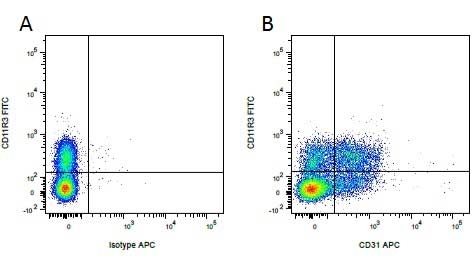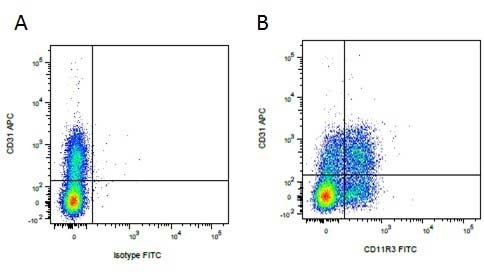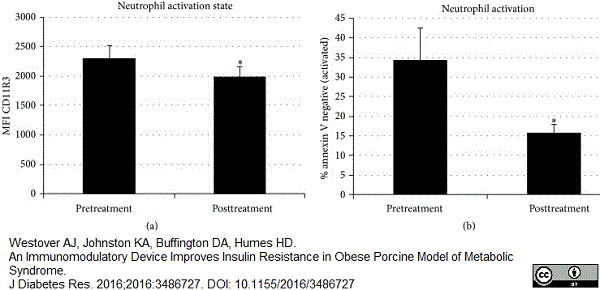CD11R3 antibody | 2F4/11




Mouse anti Pig CD11R3
- Product Type
- Monoclonal Antibody
- Clone
- 2F4/11
- Isotype
- IgG1
- Specificity
- CD11R3
| Mouse anti Pig CD11R3, clone 2F4/11 recognizes porcine CD11R3, a ~155 kDa cell surface glycoprotein, member of the alpha integrin family. Mouse anti Pig CD11R3, clone 2F4/11 was clustered as CD11R3 at the Third International Workshop on Swine Leukocyte Differentiation Antigens (Haverson et al. 2001). CD11R3 has a similar expression pattern to the human CD11b marker, being expressed on granulocytes, monocytes and alveolar macrophages, but not on lymphocytes, eythrocytes or platelets (Dominguez et al. 2001). Mouse anti Pig CD11R3, clone 2F4/11 is reported to block phagocytosis of complement-opsonized zymosan particles by polymorphonuclear granulocytes and alveolar macrophages (Bullido et al. 1996). |
- Target Species
- Pig
- Product Form
- Purified IgG - liquid
- Preparation
- Purified IgG prepared by affinity chromatography on Protein G from tissue culture supernatant
- Buffer Solution
- Phosphate buffered saline
- Preservative Stabilisers
- 0.09% sodium azide (NaN3)
- Carrier Free
- Yes
- Immunogen
- Porcine alveolar macrophages
- Approx. Protein Concentrations
- IgG concentration 1.0 mg/ml
- Fusion Partners
- Spleen cells from immunized BALB/c mice were fused with cells of the X63-Ag.8.653 myeloma cell line
- Regulatory
- For research purposes only
- Guarantee
- 12 months from date of despatch
Avoid repeated freezing and thawing as this may denature the antibody. Storage in frost-free freezers is not recommended.
| Application Name | Verified | Min Dilution | Max Dilution |
|---|---|---|---|
| Flow Cytometry | 1/25 | 1/50 | |
| Immunohistology - Frozen | |||
| Immunoprecipitation | |||
| Western Blotting |
- Flow Cytometry
- Use 10μl of the suggested working dilution to 1x106 cells in 100μl
- Histology Positive Control Tissue
- Porcine spleen
- Western Blotting
- Mouse anti Pig CD11R3 antibody, clone 2F4/11 detects a band of approximately 155 kDa in alveolar macrophage lysates under reducing conditions.
| Description | Product Code | Applications | Pack Size | List Price | Your Price | Quantity | |
|---|---|---|---|---|---|---|---|
| Mouse IgG1 Negative Control | MCA928 | F | 100 Tests |
|
Log in | ||
| List Price | Your Price | ||||||
|
|
Log in | ||||||
| Description | Mouse IgG1 Negative Control | ||||||
Source Reference
-
Bullido R et al. (1996) Monoclonal antibody 2F4/11 recognizes the alpha chain of a porcine beta 2 integrin involved in adhesion and complement mediated phagocytosis.
J Immunol Methods. 195 (1-2): 125-34.
References for CD11R3 antibody
-
Sbrana, S. et al. (2014) Phenotype Changes of Circulating Monocytes in a Hypercholesterolemic Swine Model of Coronary Artery Disease
J Cytol Histol 5:270 -
Domínguez, J. et al. (2001) Workshop studies on monoclonal antibodies in the myeloid panel with CD11 specificity.
Vet Immunol Immunopathol. 80 (1-2): 111-9. -
Sánchez-Torres C et al. (2003) Expression of porcine CD163 on monocytes/macrophages correlates with permissiveness to African swine fever infection.
Arch Virol. 148 (12): 2307-23. -
Van de Walle, G.R. et al. (2003) Transmission of pseudorabies virus from immune-masked blood monocytes to endothelial cells.
J Gen Virol. 84 (Pt 3): 629-37. -
Alvarez, B. et al. (2000) Molecular and functional characterization of porcine LFA-1 using monoclonal antibodies to CD11a and CD18.
Xenotransplantation 7: 258-266 -
Sánchez, C. et al. (1999) The porcine 2A10 antigen is homologous to human CD163 and related to macrophage differentiation.
J Immunol. 162: 5230-7 -
Thorgersen, E.B. et al. (2010) Anti-inflammatory effects of C1-Inhibitor in porcine and human whole blood are independent of its protease inhibition activity.
Innate Immun. 16: 254-64 -
Thorgersen, E.B. et al. (2010) CD14 inhibition efficiently attenuates early inflammatory and hemostatic responses in Escherichia coli sepsis in pigs.
FASEB J. 24: 712-22
View The Latest Product References
-
Baert K et al. (2015) Cell type-specific differences in β-glucan recognition and signalling in porcine innate immune cells.
Dev Comp Immunol. 48 (1): 192-203. -
Barratt-Due, A. et al. (2011) Ornithodoros moubata Complement Inhibitor Is an Equally Effective C5 Inhibitor in Pigs and Humans.
J Immunol. 187: 4913-9 -
Jacobsen, M.J. et al. (2016) Altered Methylation Profile of Lymphocytes Is Concordant with Perturbation of Lipids Metabolism and Inflammatory Response in Obesity.
J Diabetes Res. 2016: 8539057. -
Crisci, E. et al. (2012) Chimeric calicivirus-like particles elicit specific immune responses in pigs.
Vaccine. 30 (14): 2427-39. -
Debeer, S. et al. (2013) Comparative histology and immunohistochemistry of porcine versus human skin.
Eur J Dermatol. 23 (4): 456-66. -
Westover, A.J. et al. (2016) An Immunomodulatory Device Improves Insulin Resistance in Obese Porcine Model of Metabolic Syndrome.
J Diabetes Res. 2016: 3486727. -
LeLuduec, J.B. et al. (2016) Intradermal vaccination with un-adjuvanted sub-unit vaccines triggers skin innate immunity and confers protective respiratory immunity in domestic swine.
Vaccine. 34 (7): 914-22. -
Grodeland, G. et al. (2020) Targeting of HA to chemokine receptors induces strong and cross-reactive T cell responses after DNA vaccination in pigs.
Vaccine. 38 (6): 1280-1285. -
Teuben, M.P.J. et al. (2021) Standardized porcine unilateral femoral nailing is associated with changes in PMN activation status, rather than aberrant systemic PMN prevalence.
Eur J Trauma Emerg Surg. Jun 10 [Epub ahead of print]. -
Teuben, M. et al. (2021) Instant intra-operative neutropenia despite the emergence of banded (CD16dim/CD62Lbright) neutrophils in peripheral blood - An observational study during extensive trauma-surgery in pigs.
Injury. 52 (3): 426-33. -
Zhou, L. et al. (2022) Clinical improvement of sepsis by extracorporeal centrifugal leukocyte apheresis in a porcine model.
J Transl Med. 20 (1): 538.
Further Reading
-
Piriou-Guzylack, L. (2008) Membrane markers of the immune cells in swine: an update.
Vet Res. 39: 54
MCA2309GA
If you cannot find the batch/lot you are looking for please contact our technical support team for assistance.
Please Note: All Products are "FOR RESEARCH PURPOSES ONLY"
View all Anti-Pig ProductsAlways be the first to know.
When we launch new products and resources to help you achieve more in the lab.
Yes, sign me up


